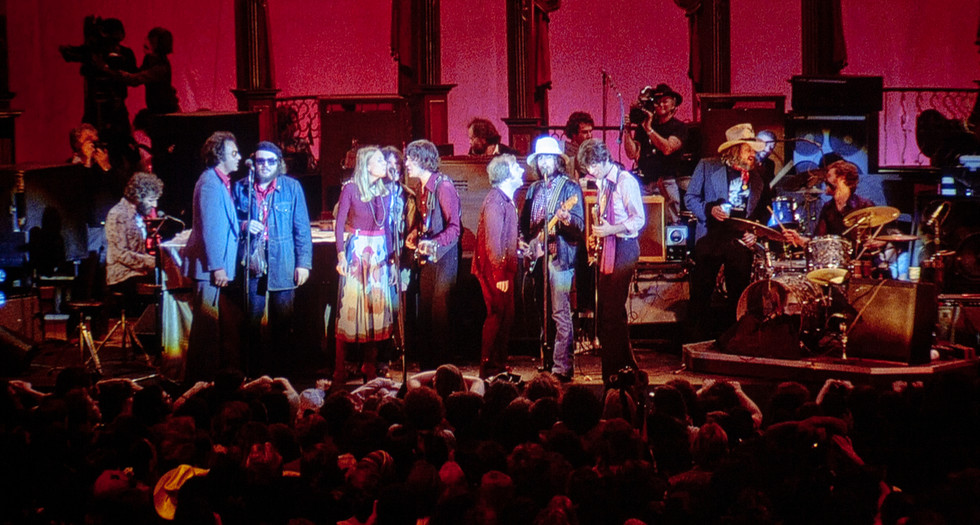Fans of The Band (and who isn’t?) will find a lot to like with “Once Were Brothers”
- Craig Shapiro
- Jul 12, 2020
- 4 min read
Updated: Feb 13, 2021
BLU-RAY REVIEW / FRAME SHOTS

Founder/guitarist/songwriter Robbie Robertson of The Band, remembers how he came up with the lyrics for the classic "The Weight."
I pulled into Nazareth, was feelin 'bout half past dead
I just need some place where I can lay my head
Hey, mister, can you tell me where a man might find a bed?
He just grinned and shook my hand, "no" was all he said
[Chorus]
Take a load off, Fanny
Take a load for free
Take a load off, Fanny
And (and) (and) you put the load right on me
(You put the load right on me)
“ONCE WERE BROTHERS: ROBBIE ROBERTSON AND THE BAND”
Blu-ray, 2019, rated R for some language and drug references; Streaming via Amazon Prime Video, Apple TV, FandangoNOW, Google Play, Vudu, YouTube
Best extra: none included
(Click an image to scroll the larger versions)
BRUCE SPRINGSTEEN speaks for a whole lot of folks when he recalls hearing The Band for the first time: “[H]ere come these voices that sound like you’ve never heard them before – and they’ve been around forever and ever.”
That sentiment still holds. “The Weight,” “Up on Cripple Creek,” “The Night They Drove Old Dixie Down,” “Tears of Rage,” “Across the Great Divide,” “Rag Mama Rag” and “Shape I’m In” are as stirring and timeless as they were more than 50 years ago.
Based on “Testimony: A Memoir,” the 2017 memoir by founder/guitarist/songwriter Robbie Robertson, “Once Were Brothers” celebrates that legacy, even if it’s somewhat filtered. Richard Manuel took his life in 1986, Rick Danko died of heart failure, brought on by drug and alcohol abuse, in 1999, Levon Helm succumbed to cancer in 2012, and Garth Hudson, the only other surviving member, lives out of the spotlight in Woodstock, N.Y. He’s only heard in an archival snippet.
That leaves Robertson, and that’s fine.
(1) Robbie Robertson gets his first guitar. (2) In 1958, he hooked up with rockabilly Ronnie Hawkins' and join The Hawks. (3) Robinson and members of The Band were Bob Dylan's first rock and roll backup band. (4) Robinson meets his French Canadian wife Dominique in Paris.

Rehearsal of The Band - 1969 Woodstock, NY
So, what happened? He says that everyone intended to take a break after their star-studded, 1976 farewell concert at San Francisco’s Winterland Ballroom (memorably documented by Martin Scorsese two years later in “The Last Waltz”), but “just forgot to come back.”
But as “Once Were Brothers” makes clear, there was more to it than that. Springsteen also recalls being struck by the group’s name, with its implication that the whole is greater than the sum of its parts. The second half of the film’s title – “Robbie Robertson and The Band” – implies otherwise.
If Robertson, now 77, also wanted to reclaim his place, that’s fine, too.
The big picture is the big draw here and, tapping a trove of archival footage and new interviews with Springsteen, Scorsese, Eric Clapton, Van Morrison, Robertson’s ex-wife Dominique, blues great Taj Mahal, and others, Daniel Roher, the young Canadian filmmaker chosen by Robertson to direct the doc, doesn’t disappoint.
(1) 1950s rockabilly Ronnie Hawkins. (2) Blues great Taj Mahal. (3) The son of a New Jersey bus driver, Bruce Springsteen. (4) Rock guitar legend Eric Clapton.

In the recording studio, Robertson makes final adjustments to the new song "Once Were Brothers."
Robertson was a young teenager when he left Toronto on a train to Arkansas to audition for rock and roll journeyman Ronnie Hawkins. He got the job and was writing songs for Hawkins, who shares some priceless, unabridged insights, by the time he was 16. That’s also when he met Helm, who was the Hawks’ drummer. As other members departed, Hawkins relied on Robertson to find replacements. Enter countrymen Manuel, Danko, and Hudson.
Flash forward and The Band is backing Bob Dylan on his 1966 European tour. He had picked up the electric guitar and, just like in the States, the decision didn’t exactly go over well. In a movie replete with memorable clips, the concert footage and a sequence in the car following a show stand out.
The rest, as they say, is history. The Band retreated to Woodstock and in 1968 released “Music from Big Pink,” not just one of the greatest debuts ever, but still one of the greatest LPs, period. In rewriting the Americana music playbook, it set a bar that has yet to be moved. They were unable to tour behind it, though, after Danko broke his neck in a car accident. The arrival of their self-titled second album the following year only heightened the mystique.
There’s no arguing that “Once Were Brothers” lifts that veil, though some viewers may grumble because, other than the closing “Old Dixie,” which was borrowed from “The Last Waltz,” the film serves up only snatches of songs. It goes with the territory. (Hint: I found my copy of “Big Pink” at a used vinyl store.) Those snatches, by the way, are clear and full-bodied. The visuals are fine, too. The footage looks way better than you might expect and the interviews are sharp.
- Craig Shapiro
(1&2) The Band - photograph for their first album "Music from Big Pink." Keyboardist Garth Hudson holds their dog in front of the Big Pink house.
“The Last Waltz”
(1) Right, Eric Clapton joined Robinson and the rest of The Band for the special performance at the Winterland Ballroom in San Francisco. (2) Also, on stage that night - Neil Diamond, Dr. John, Joni Mitchell, Van Morrison, Bob Dylan, and Ronnie Hawkins.




























Comments